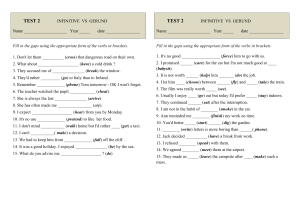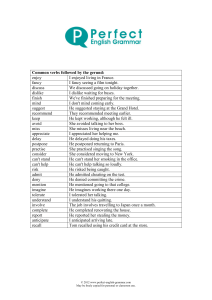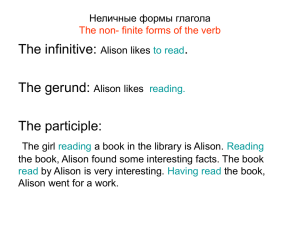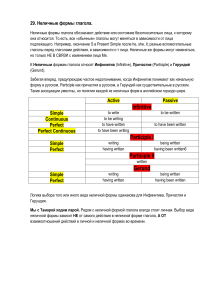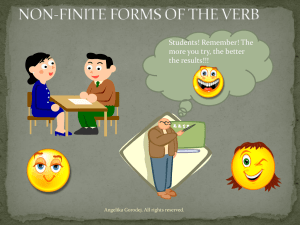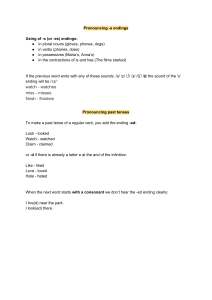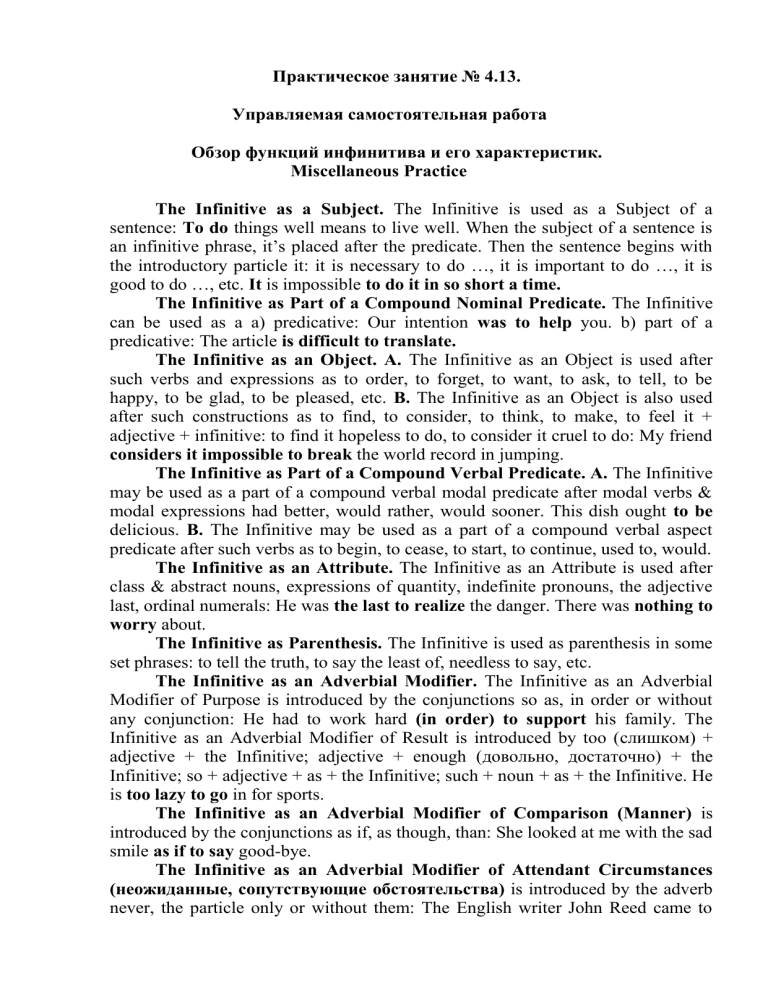
Практическое занятие № 4.13. Управляемая самостоятельная работа Обзор функций инфинитива и его характеристик. Miscellaneous Practice The Infinitive as a Subject. The Infinitive is used as a Subject of a sentence: To do things well means to live well. When the subject of a sentence is an infinitive phrase, it’s placed after the predicate. Then the sentence begins with the introductory particle it: it is necessary to do …, it is important to do …, it is good to do …, etc. It is impossible to do it in so short a time. The Infinitive as Part of a Compound Nominal Predicate. The Infinitive can be used as a a) predicative: Our intention was to help you. b) part of a predicative: The article is difficult to translate. The Infinitive as an Object. A. The Infinitive as an Object is used after such verbs and expressions as to order, to forget, to want, to ask, to tell, to be happy, to be glad, to be pleased, etc. B. The Infinitive as an Object is also used after such constructions as to find, to consider, to think, to make, to feel it + adjective + infinitive: to find it hopeless to do, to consider it cruel to do: My friend considers it impossible to break the world record in jumping. The Infinitive as Part of a Compound Verbal Predicate. A. The Infinitive may be used as a part of a compound verbal modal predicate after modal verbs & modal expressions had better, would rather, would sooner. This dish ought to be delicious. B. The Infinitive may be used as a part of a compound verbal aspect predicate after such verbs as to begin, to cease, to start, to continue, used to, would. The Infinitive as an Attribute. The Infinitive as an Attribute is used after class & abstract nouns, expressions of quantity, indefinite pronouns, the adjective last, ordinal numerals: He was the last to realize the danger. There was nothing to worry about. The Infinitive as Parenthesis. The Infinitive is used as parenthesis in some set phrases: to tell the truth, to say the least of, needless to say, etc. The Infinitive as an Adverbial Modifier. The Infinitive as an Adverbial Modifier of Purpose is introduced by the conjunctions so as, in order or without any conjunction: He had to work hard (in order) to support his family. The Infinitive as an Adverbial Modifier of Result is introduced by too (слишком) + adjective + the Infinitive; adjective + enough (довольно, достаточно) + the Infinitive; so + adjective + as + the Infinitive; such + noun + as + the Infinitive. He is too lazy to go in for sports. The Infinitive as an Adverbial Modifier of Comparison (Manner) is introduced by the conjunctions as if, as though, than: She looked at me with the sad smile as if to say good-bye. The Infinitive as an Adverbial Modifier of Attendant Circumstances (неожиданные, сопутствующие обстоятельства) is introduced by the adverb never, the particle only or without them: The English writer John Reed came to Russia to die there. – Английский писатель Джон Рид приехал в Россию и там умер. Выполните упражнения: EX. 1. Paraphrase the sentences using the Infinitive as a Subject with the introductory particle it. 1. To keep the windows open during a thunder storm is very dangerous. 2. To have been treated like this for years is very unbearable. 3. To have been living abroad alone for a few years made him feel quite lonely. 4. To be sent to England on a business trip became his dream. 5. To come to a decision was difficult. 6. To go there this morning is of no use. EX. 2. Paraphrase the sentences using the Infinitive as a predicative or part of a predicative. 1. To cure some diseases is the main problem of medicine. 2. To go on a picnic was our plan. 3. To see the Dean was the first thing he did. 4. To become a shipbuilding engineer was my brother’s dream. 5. It’s pleasant to dance to this music. 6. It’s hard to follow him. 7. It’s not easy to find a good job. 8. It’s impossible to read his handwriting. EX. 3. Paraphrase using the Infinitive as an Object. 1. Ann was happy that she had been sent to college. 2. She was pleased that she had found that book. 3. The children were anxious that they were visiting Paris in June. 4. They thought that they had lost the way. 5. The father promised that we would go to the country on Sunday. 6. I expect that I will see you tomorrow. 7. I think that it’s useful to keep to a diet of fruits. EX. 4. Answer the questions using the Infinitive as a part of a Compound Verbal Predicate. 1. I want to get some glimpses of London, from where should I start sightseeing? 2. Would you rather study at Oxford or Cambridge? 3. Did you begin to go in for sports at school or at the University? 4. Do you continue to work hard at your pronunciation? EX. 5. Paraphrase using the Infinitive as an Attribute. 1. A Manchester player was the first who scored a goal. 2. He isn’t a man who would stick to his promise. 3. Young Burton had no one who could help him. 4. There are many places of interest which should be visited. 5. Mr Brown was the last who left the room. 6. It is a chance which shouldn’t be missed. EX. 6. Paraphrase the sentences using the Infinitive as an Adverbial Modifier. 1. We must hurry because we don’t want to miss the train. 2. In 2012 the best athletes of the world will gather in London because they want to take part in the Olympic games. 3. Jim plays football well enough that he can take part in competitions. 4. The boxer was so strong that he could win the match easily. 5. He was so fortunate that he could win 1000 pounds in lottery. 6. Many of our students are too busy, they can’t go in for sports regularly. 7. He isn’t such a man, he always keeps to his promise. 8. The man raised his hand as if he wanted to draw our attention. 9. The speaker stopped suddenly as though he wanted to take breath. 10. Andrew left for Australia at the age of 18 & he never returned home. 11. After classes I came home & found the door locked. 12. He returned from the office & he was struck by that fantastic news. EX. 7. Translate using the Infinitive in different functions. 1. Сделать это за короткое время невозможно. 2. Его лучше оставить одного. 3. Пора идти домой. 4. Наше намерение – помочь тебе. 4. Его обязанностью по дому было убирать в своей комнате и ходить за покупками. 5. Мистеру Уолкеру трудно угодить. 6. Решить эту проблему было очень трудно. 7. Он пообещал бросить свои вредные привычки. 8. Мой друг научил меня играть в теннис. 9. Я считаю, что полезно заниматься фитнесом. 10. Я нахожу трудным перевести эту статью. 11. Он начал пожимать руку каждому, кто присутствовал на вечере. 12. Я должен сходить в библиотеку. 13. Джуди не знала, что люди были когда-то обезьянами. 14. Кто последним входил в комнату? 15. Я теперь не помню, кто первым сказал это. 16. Вот статья, на которую следует обратить внимание. 17. Честно говоря, я предпочитаю хоккей футболу. 18. Откровенно говоря, вратарь был в плохой форме. 19. В довершение всего, я разбила вазу. 20. После занятий мы остались в университете, чтобы позаниматься в зале прослушивания. 21. Наши спортсмены много тренируются, чтобы успешно выступить на чемпионате. 22. Ветер был слишком сильным, чтобы продолжать соревнования по прыжкам на лыжах. 23. Он был тем человеком, кто помог нам. 24. Он пожал плечами, как будто показывая своё безразличие. 25. Она закричала, как будто бы предупреждая меня. 26. В 30-е годы Алексей Толстой вернулся в Россию и никогда не уехал снова. 27. Наконец, он смог поднять один из ящиков и уронил его с грохотом.
